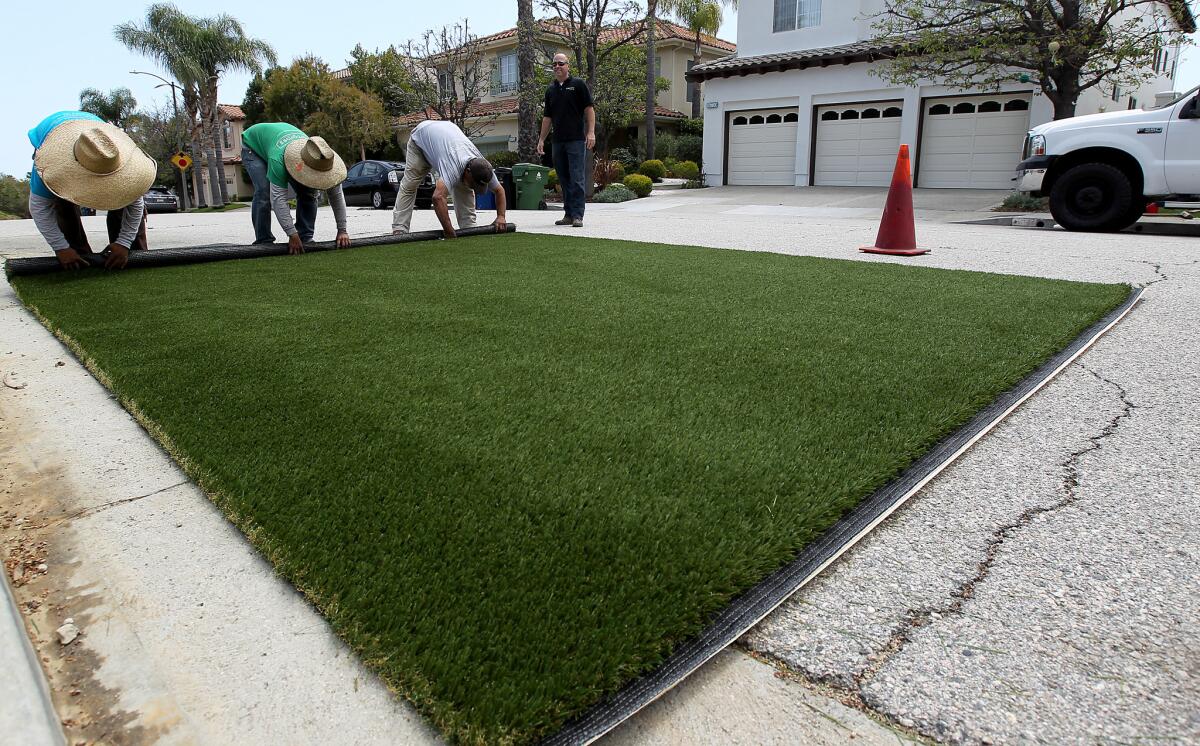Ruling expected Friday on releasing names, addresses of DWP turf rebate recipients

Workers roll up a pre-measured piece of artificial grass for installation in the backyard of a home in Pacific Palisades.
- Share via
A Los Angeles County Superior Court judge could rule as soon as Friday on whether the Metropolitan Water District of Southern California must release information about the recipients of millions of dollars in turf replacement rebates.
The Los Angeles Department of Water and Power is suing the regional water agency to block the release of the data to the San Diego Union-Tribune, a sister newspaper of the Los Angeles Times. Three other agencies — West Basin Municipal Water District, Foothill Municipal Water District and Upper San Gabriel Valley Municipal Water District — joined the suit after it was filed at the end of July.
The newspaper is seeking the names and addresses of people and businesses who have received money to swap their lawns for drought-tolerant landscaping as part of the turf replacement rebate program.
The rebate program exploded in popularity last year, going through its $340-million budget in a matter of months.
The data has remained private since Judge James C. Chalfant issued an order in August that temporarily prevented the MWD from giving it out. The MWD has already released detailed rebate information for agencies not involved in the suit.
All parties appeared at a hearing Thursday before Chalfant, who did not issue a tentative ruling.
See more of our top stories on Facebook >>
Chalfant said his decision would hinge on a section of the California Public Records Act that allows the release of utility customers’ names and addresses when the public interest in disclosure of the information “clearly outweighs” the public interest in nondisclosure. Chalfant noted this is the most rigorous judicial test and leaves the burden of proof to the DWP.
Kelly Aviles, an attorney for the Union-Tribune, argued that the public has a right to the information in order to scrutinize the effectiveness and fairness of a ratepayer-funded program.
“I’m hopeful that the judge understands the minimal privacy interests do not override the public’s ability to obtain information on how the millions of dollars in this program were spent,” Aviles said after court Thursday.
In November, the Los Angeles city controller released an audit criticizing the program for not being a cost-effective method of water conservation.
Tina Shim, an attorney for the DWP, said the agency has complied with the disclosure of many other categories of information, and that its their primary concern is for the privacy of recipients who may not have known their information would be made public.
NEWSLETTER: Get the day’s top headlines from Times Editor Davan Maharaj >>
“We’re concerned about a public agency’s obligation to protect the privacy interests of private customers,” Shim said. “These are private individuals. These are not public employees, these are not people who have committed any crimes, these are not people have broken or violated any ordinances.”
Shim and other attorneys argued that there are other ways to assess the efficiency of the program that don’t require the release of this data.
When discussion turned to disclosure of rebates paid to businesses and public agencies, Chalfant seemed to side with the Union-Tribune.
“We’re talking U.S. Supreme Court and California Supreme Court authority here: There is no privacy right, constitutional privacy right, in a corporation,” he said. “A corporation has no privacy interest here in not having their name and address revealed. We’re talking about individuals. We’re not talking about corporations or public agencies or even businesses.”
An attorney representing the three smaller districts said she was concerned mainly about the pairing of the names and addresses and cited legal precedent of records of just one category being released instead of both.
Heriberto Diaz, an attorney representing the MWD, said the agency believes the interest in disclosure outweighs the interest in nondisclosure.
Both MWD spokesman Bob Muir and DWP spokesman Joe Ramallo declined to comment until after the judge gives his ruling.
Twitter: @taygoldenstein
ALSO:
Oscars 2016: Here’s why the nominees are so white -- again
Chino Hills 7-Eleven still waiting for its Powerball winner to come forward
Tension between ranchers and federal officials is dangerously high in Nevada
More to Read
Sign up for Essential California
The most important California stories and recommendations in your inbox every morning.
You may occasionally receive promotional content from the Los Angeles Times.










